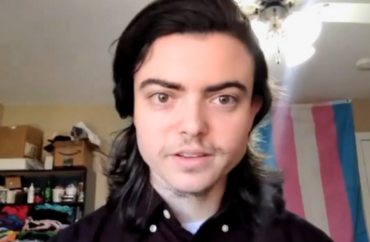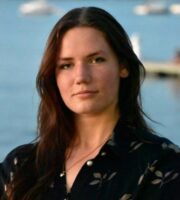
MADISON, Wis. – “The sex binary originated as a eugenic construct,” Sam Sharpe, a teaching instructor from Kansas State University, said at a gender studies panel at the University of Wisconsin-Madison.
Sharpe (pictured) gave a presentation titled “Facilitating Intersex Embodiment Through Inclusive STEM Pedagogy” at the Women’s and Gender Studies Consortium conference last Friday, April 12.
The instructor uses “they/them” pronouns and “is a transgender and intersex peer support worker, researcher, advocate, and educator.” Sharpe is also a “drag performer” according to the instructor’s profile at the Eating Recovery Center.
The College Fix attended the event, but the organizers banned all media from taking photos and recording audio and video. Recording is prohibited throughout the entire three-day conference held at the publicly funded university.
“Through collaboration with feminist studies scholars, I learned that the idea of a discrete sex binary did not originate from validated biological inquiry but from cultural prejudices validated by eugenics and subsequently enshrined into a self-perpetuating ideology, ” Sharpe further stated.
The presentation’s description states that, “… STEM educators and clinicians have an ethical obligation to challenge the portrayal of intersex as a biological oddity, humanize the way they communicate and teach about sex, and support the work of intersex rights movements toward facilitating the possibility for authentic intersex embodiment.”
“In contrast, a feminist approach to teaching sex diversity must actively address and disrupt these hegemonic ideas of a sex binary,” the presentation states.
Sharpe’s presentation was part of a panel titled “Embodiment and Well-Being in STEM” that consisted of two 15-minute presentations, a 30-minute panel, and a Q&A session.
In the talk, Sharpe recommended STEM educators provide examples of sex diversity when teaching biology, for example other species with more than two sexes like some fungi and sex-switching clown fish.
“We can situate variation in sex traits alongside other forms of human biological variation such as height and eye color,” Sharpe stated.
University of Wisconsin-Oshkosh student Ash Bott also spoke on the panel about the “presence of the LGBTQ+ community and allyship in the 11 STEM departments” on campus.
“We examined both digital and physical spaces and quantified visible symbols of diversity, inclusion, and allyship,” according to the talk description.
“Identity can be invisible, but allyship is usually a little bit more visible inherently” Bott said during the talk.
Bott offered suggestions to UW-Oshkosh in order to improve their “LGBTQ+ Visibility” and “Trans and Gender Diverse Visibility.”
Bott recommended universities have faculty and staff complete “training on LGBTQ+ best practices” to improve climate for LGBTQ+ people and then to put a sticker of completion on their doors.
“Just to let coworkers and students know that this is a safe space, and I am a safe person,” Bott said.
Additionally, Bott recommended that the university allow for “voluntary disclosure of pronouns in email signatures and website bios.”
“We live in a dangerous time to be LGBTQ+,” Bott said.
The final talk of the panel discussed the various forms of perceived sexism.
This conference has been hosted annually for 49 years.
This year, it includes speeches and breakout sessions on a range of feminist topics, including one on “Anti-oppressive pedagogical practice”, a keynote on “Criminalizing the Crisis: Bodies ‘Out of Place’ and Neoliberal (Dis)Order”, and a speech titled “Capitalism, Caste, and Creativity: Pushing Back on Spaces and Systems of Oppression.”
Fourteen co-sponsors of the event are listed on the conference website, including the UW-Madison Gender and Sexuality Campus Center and the UW-Madison Department of Gender and Women’s Studies.
The website also states that the event is being held “under the auspices of the UNESCO Chair on Gender, Wellbeing and a Culture of Peace as part of a global United Nations Platform on education, science, and culture.”
The Fix also attended another panel last week about “fat liberation.”
“We reject the idea that a body type can be a disease,” UW-Madison librarian Kelsey Foster stated. “It’s possible to be fat and healthy, fat and unhealthy, thin and healthy, thin and unhealthy.”
MORE: IU professor studies LGBT caregivers of dementia patients with federal funds
IMAGE CAPTION AND CREDIT: Kansas State University instructor Sam Sharpe; STEM LGBTQ and You/YouTube
Like The College Fix on Facebook / Follow us on Twitter






Please join the conversation about our stories on Facebook, Twitter, Instagram, Reddit, MeWe, Rumble, Gab, Minds and Gettr.